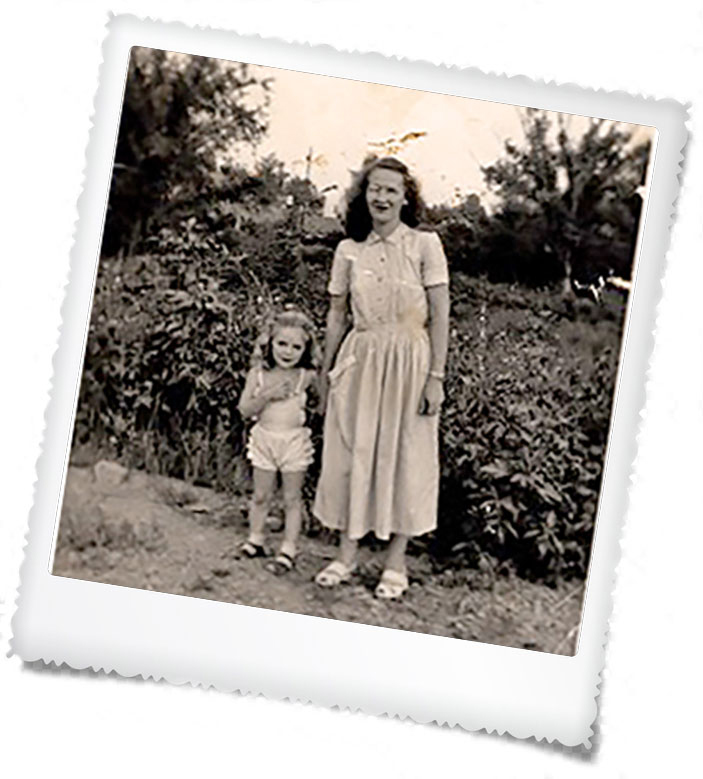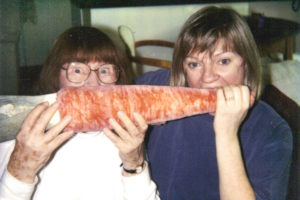
Rita Kempley and her mother, Musaetta Abrams. / Family photo.
By Rita Kempley
MY MOTHER died 20 years ago, but if it were up to her, I still wouldn’t know it. She wouldn’t want me to worry. She never told me when someone dear to me was ill, dying or, God forbid, gone.
By my mid-30s, I had missed the funerals of my grandparents, several aunts and uncles and a few childhood friends. For all I knew, whole branches of my family might have vanished before I caught on to Mom’s modus operandi.
On a trip back home, to Frankfort, Kentucky, circa 1974, we were sitting around the kitchen table playing Rook, a game using cards that, unlike standard decks, had nothing to do with Satan. My mother was winning and none too humble about piling up the points. In an attempt to distract her, I asked about Gin, a former neighbor with a history of heart disease.
Mother focused her one good eye on her cards. “She’s no longer with us,” she said, making it sound as if Gin had simply picked up one day and moved to Versailles (pronounced Vur-SALES by us Kentuckians).
“But, Mom, I would have at least wanted to send flowers . . . “
“Well,” she responded, “when it’s my time, just put me in a cardboard box and throw me in the Kentucky River.”
“Okay, Mom.” Any argument would only encourage her.
Once, I was home from the University of Missouri on spring break, and Lucy, a high school girlfriend, and I were acting like fools in an effort to make my mom laugh. She stood at the stove, soberly tending a skillet full of pork chops sizzling in bacon grease. Our old material—such as eating with our mouths open—wasn’t working. We’d have to go for something more sophisticated now that we were college girls.
We weren’t really mean girls, but this was an emergency. I’m ashamed to say it, but we turned to a gothic story about a classmate’s mother.
A life-size portrait of the woman’s late husband loomed over the living room, and, bless her heart, she still set a place for him at the dinner table. He had died four years earlier, but his widow couldn’t or wouldn’t part with her grief, which she supplemented with the sorrows of others. Her daughter complained that her mom’s college care packages always included the obituary pages of the Frankfort State Journal.

Rita Kempley, right, and her mother, Musaetta Abrams, chowing down on a stuffed carrot, a gift from Daughter to Mom. Rita says Mom hung it proudly in her kitchen. / Family photo.
My mother had buried my father many years before, placed a gravestone on top and never set a plate for him again. “When you’re dead, you’re dead,” she said, shoving another pork chop onto Lucy’s plate.
Lucy and I cracked up and needed only the slightest pretext to repeat this truism. My mother, however, took the conversation to heart. Instead of fat envelopes full of obits, she sent me cheery notes from home. No words were minced, but as we journalists say, she always buried the lede:
Dear Daughter,
We’re all fine. The weather is fine. Hope you are fine.
Love,
Mother
P.S. The dog died.
That was hard to top, but I also remain fond of “P.S. Aunt Virgie’s leg was amputated.”
Like many of my relatives, Aunt Virgie had “sugar dibeetus.” My mother would eventually develop the disease, which she assured me she had under control. She certainly looked healthy, girlish even, in her late 70s, so I decided to believe in her immortality as much as she did.
She never meant to deceive me. She was in denial, according to my psychiatrist of 42 years. Then again, maybe she knew me better than I realized. I didn’t acknowledge my fear that she would die, and I would never discover she was no longer with us. Unlikely as that prospect may sound, it wasn’t entirely out of the realm of possibility.
For that matter, she had never officially confirmed that my father was no longer with us. I was 7 years old when he was killed instantly in a car accident. My mother sent me out to play in the sprinkler while she talked with a strange man, then gave him one of my dad’s suits. I found this very mysterious.
The following day we dressed in our Sunday clothes—also very mysterious—and went to Harrod Brothers funeral home. There was a man in the coffin who looked like my father, but I told myself that someone had put a mannequin in the coffin just to trick me. Whoever he was, they put him in the ground at Monterey where my beloved grandmother had been buried several weeks before. Since then, my glass has been half empty and I have always expected the worst.
My mother so wanted to give me happy endings, she could hardly bring herself to mention her will, which she brought up offhandedly one night over another pork chop dinner in May of 1997. Ed, my husband, was explaining that high cholesterol prevented him from taking a third helping of Southern fried hog.
“Terrible when you can’t eat what you want,” she said knowingly—although, as a diabetic, she hadn’t completely sworn off chocolate cake, which she served that evening after finally relocating it in the back seat of her car. Mother had never been one to put things where they belonged. But losing the cake had upset her, I could tell.
Jimmy, her youngest brother, was suffering from Alzheimer’s, which she tried to ignore even though he was incontinent and never spoke anymore. “He understands what we’re saying,” Mother assured us.
We nodded because there was no reason not to.
Ed complimented the cake—she always made one when we visited—and as we finished off the crumbs, Mom began to tell us about an argument she had with her sister-in-law, Margaret, about writing a will. “Well, I told her, you were my only child . . . ” she recalled with obvious irritation. “It was none of her business . . . ” She folded her arms over her chest and frowned at the memory.
Ed and I were wondering where this is going.
“I have a will,” she said. “If you ever need it, look behind the can of stewed tomatoes on the top shelf of the cabinet to the left of the sink.”
As we would discover later, Margaret had been one of three witnesses to the document, which was hand-written on lined paper (probably from one of my old school notebooks). The other two witnesses were dead, and although the paper clearly bore her signature, my aunt insisted she had never seen, much less signed it. I guess denial was in the DNA.
A former Washington Post movie critic, Rita Kempley is author of The Vessel and is at work on a memoir about Mom called P.S. The Dog Died.

Love you, Rita! ♥️
(Please add me to your email list!)
What a beautiful tribute! Your writing transported me and left me wanting (much) more. btw- where’s the carrot now?
I loved the fact that you chose this for a Mother’s Day message. Very sweetly vulnerable and so honest. Should resonate with many.